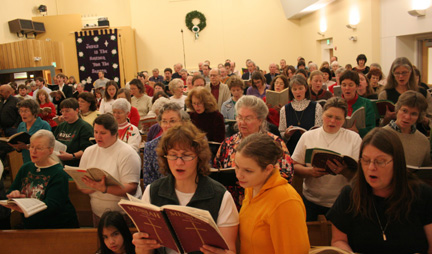
To identify as “spiritual but not religious” is a way to communicate we are disenfranchised with religious community. Lillian Daniel thinks “a lot of those who can’t tolerate organized religion are really just frustrated by other people.”
Daniel continues, “It takes a certain maturity to find God in the person sitting next to you who not only voted for the wrong political party but has a baby who is crying while you’re trying to listen to the sermon. Community is where the religious rubber meets the road. People challenge us, ask hard questions, disagree, need things from us, require our forgiveness. It’s where we get to practice all the things we preach.”
How church leaders address this is difficult, particularly because churches haven’t always been models of what community can and should be (see “Why They’re Leaving”). However, the reality is that being part of a community is hard work.
It’s interesting to me that when the church gets a little messy, people often harken back to the early church and wish we could be more like they were. Obviously this hope doesn’t arise from a close reading of Scripture. The early church had its share of differences of opinion, conflict, and strained relationships, and so goes the trajectory of church history. Yet in the end, even with all this messiness, millennia of experience have shown that the journey of faith needs to be shared.
I think Daniel is right in believing that some think if we “could just kick all of the flawed human beings out of the church, we could really do this Jesus thing.” The truth is that many of us have had that thought, until we realize we be kicked out too! The bane and beauty of the church is the call to share life and faith together.
Michael S. Bos
Daniel continues, “It takes a certain maturity to find God in the person sitting next to you who not only voted for the wrong political party but has a baby who is crying while you’re trying to listen to the sermon. Community is where the religious rubber meets the road. People challenge us, ask hard questions, disagree, need things from us, require our forgiveness. It’s where we get to practice all the things we preach.”
How church leaders address this is difficult, particularly because churches haven’t always been models of what community can and should be (see “Why They’re Leaving”). However, the reality is that being part of a community is hard work.
It’s interesting to me that when the church gets a little messy, people often harken back to the early church and wish we could be more like they were. Obviously this hope doesn’t arise from a close reading of Scripture. The early church had its share of differences of opinion, conflict, and strained relationships, and so goes the trajectory of church history. Yet in the end, even with all this messiness, millennia of experience have shown that the journey of faith needs to be shared.
I think Daniel is right in believing that some think if we “could just kick all of the flawed human beings out of the church, we could really do this Jesus thing.” The truth is that many of us have had that thought, until we realize we be kicked out too! The bane and beauty of the church is the call to share life and faith together.
Michael S. Bos
 RSS Feed
RSS Feed
